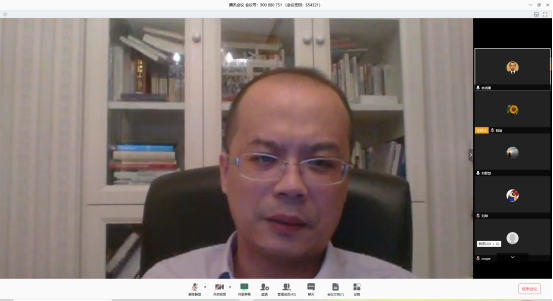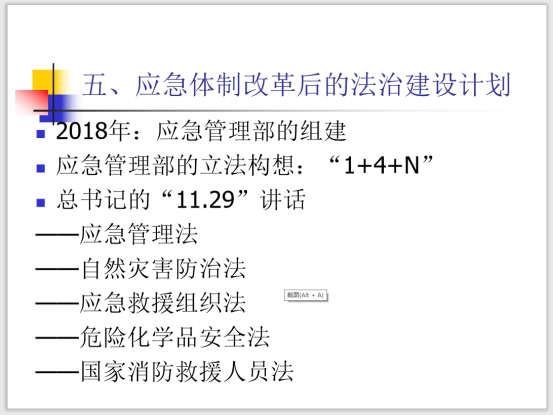On the night of March 17, 2020, the School of Juris Master of China University of Political Science and Law (CUPL) held a lecture on China’s Emergency Response Lawvia Tencent Meetinglive-streaming system, which was the third episode in the expert lecture series on legal matters in the pandemic containment period. The lecturer was Lin Hongchao, Director of the Research Base for Emergency Management Laws and Policies,CUPLas well as a professor and doctoral supervisor with theSchool of Law-based Government.
At the beginning of the lecture, Prof. Liu Zhihui introduced Prof. Lin Hongchao to everyone. Prof. Lin Hongchao is an expert with the think tank on national emergency management policies, regulations, and standards as well as a guide expert for building a national health emergency system and an advisor to Beijing Emergency Management Bureau. He participated in the drafting of the Emergency Response Law and is one of the main authors of the Beijing Measures for the Implementation of the Emergency Response Law and the Regulations on Emergency Response to Production Safety Accidents. He is currently drafting the Emergency Management Law, the Emergency Rescue Organization Law, and the Law on the Prevention and Control of Natural Disasters.

The outbreak of the COVID-19 pandemic and the efforts to contain it have disrupted normal social order and caused a lot of legal issues. From the perspective of emergency management, Prof. Lin Hongchao shared his thoughts on several legal issues that had been around since the outbreak of the pandemic.
First of all, Prof. Lin Hongchao briefly introduced the different origins of emergency response laws in China and the West. The emergency response laws of Western countries originated from civil defense in wars, whereas China's Emergency Response Law originated from disaster prevention and relief.
Prof. Lin described the process of formulating the Emergency Response Law in modern China. In the past, there was no concept of "emergency management law" or "emergency response law". Instead, different laws were scattered in various fields, including natural disasters, accidents, public health, and social security. Prof. Lin Hongchao analyzed the characteristics, responsible departments,as well asprevention and control measures in those four fields.

Then, he sorted out the landmark emergencies that occurred between 2007 when the Emergency Response Law was promulgated and 2017 when the 19th National Congress of the CPC was held. Healsoanalyzed the new challenges that these emergencies posed to the emergency response system, saying that the Emergency Response Law had limitations in the face of new challenges.
The COVID-19 pandemic broke out against the backdrop of China reforming its emergency management system and modernizing its emergency management capabilities. Prof. Lin Hongchao reflected on what had been done to contain the pandemic in the previous two months and put forward several issues that should be paid attention to in the emergency legal system. First, the mechanism whereby the Emergency Response Law is implemented. Second, the lack of an Emergency State Law. Third, additional reform to emergency management agencies.
Prof. Liu Zhihui moderated a Q&A session, where teachers and students scrambled to asked questions. Prof. Lin answered such questions as how the emergency law authorizes governmental departments to exercise power, how much room there is for civil and commercial laws to play a role in the Emergency Response Law’s mechanism, and how the civil society should coordinate with governmental departments in relief efforts. Finally, Prof. Liu Zhihui, on behalf of the School of Juris Master, expressed gratitude to Prof. Lin Hongchao and other teachers who participated in the lecture, including Zhu Xiaojuan and Luo Zhimin. She hoped that the lecture had given the students a more comprehensive and in-depth understanding of China's Emergency Response Law.